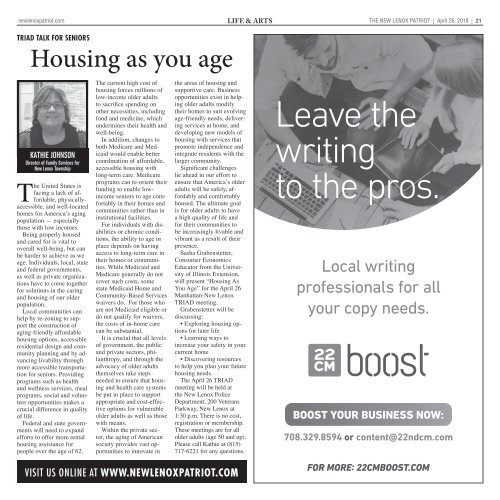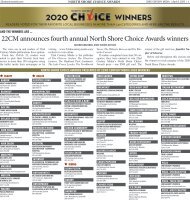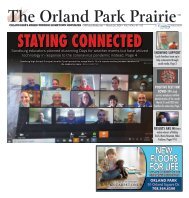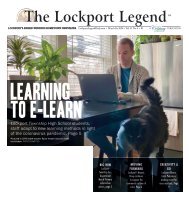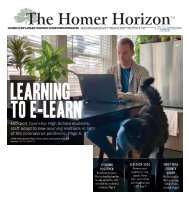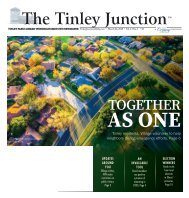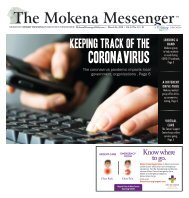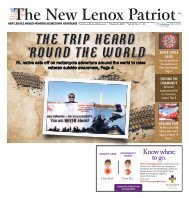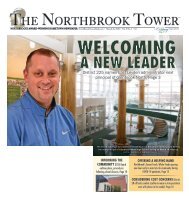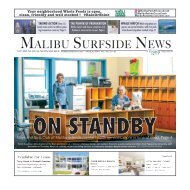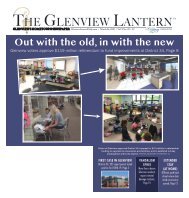Create successful ePaper yourself
Turn your PDF publications into a flip-book with our unique Google optimized e-Paper software.
newlenoxpatriot.com LIFE & ARTS<br />
the New Lenox Patriot | April 26, 2018 | 21<br />
TRIAD TALK FOR SENIORS<br />
Housing as you age<br />
Kathie Johnson<br />
Director of Family Services for<br />
New Lenox Township<br />
The United States is<br />
facing a lack of affordable,<br />
physicallyaccessible,<br />
and well-located<br />
homes for America’s aging<br />
population — especially<br />
those with low incomes.<br />
Being properly housed<br />
and cared for is vital to<br />
overall well-being, but can<br />
be harder to achieve as we<br />
age. Individuals, local, state<br />
and federal governments,<br />
as well as private organizations<br />
have to come together<br />
for solutions in the caring<br />
and housing of our older<br />
population.<br />
Local communities can<br />
help by re-zoning to support<br />
the construction of<br />
aging-friendly affordable<br />
housing options, accessible<br />
residential design and community<br />
planning and by advancing<br />
livability through<br />
more accessible transportation<br />
for seniors. Providing<br />
programs such as health<br />
and wellness services, meal<br />
programs, social and volunteer<br />
opportunities makes a<br />
crucial difference in quality<br />
of life.<br />
Federal and state governments<br />
will need to expand<br />
efforts to offer more rental<br />
housing assistance for<br />
people over the age of 62.<br />
The current high cost of<br />
housing forces millions of<br />
low-income older adults<br />
to sacrifice spending on<br />
other necessities, including<br />
food and medicine, which<br />
undermines their health and<br />
well-being.<br />
In addition, changes to<br />
both Medicare and Medicaid<br />
would enable better<br />
coordination of affordable,<br />
accessible housing with<br />
long-term care. Medicare<br />
programs can re-orient their<br />
funding to enable lowincome<br />
seniors to age comfortably<br />
in their homes and<br />
communities rather than in<br />
institutional facilities.<br />
For individuals with disabilities<br />
or chronic conditions,<br />
the ability to age in<br />
place depends on having<br />
access to long-term care in<br />
their homes or communities.<br />
While Medicaid and<br />
Medicare generally do not<br />
cover such costs, some<br />
state Medicaid Home and<br />
Community-Based Services<br />
waivers do. For those who<br />
are not Medicaid eligible or<br />
do not qualify for waivers,<br />
the costs of in-home care<br />
can be substantial.<br />
It is crucial that all levels<br />
of government, the public<br />
and private sectors, philanthropy,<br />
and through the<br />
advocacy of older adults<br />
themselves take steps<br />
needed to ensure that housing<br />
and health care systems<br />
be put in place to support<br />
appropriate and cost-effective<br />
options for vulnerable<br />
older adults as well as those<br />
with means.<br />
Within the private sector,<br />
the aging of American<br />
society provides vast opportunities<br />
to innovate in<br />
the areas of housing and<br />
supportive care. Business<br />
opportunities exist in helping<br />
older adults modify<br />
their homes to suit evolving<br />
age-friendly needs, delivering<br />
services at home, and<br />
developing new models of<br />
housing with services that<br />
promote independence and<br />
integrate residents with the<br />
larger community.<br />
Significant challenges<br />
lie ahead in our effort to<br />
ensure that America’s older<br />
adults will be safely, affordably<br />
and comfortably<br />
housed. The ultimate goal<br />
is for older adults to have<br />
a high quality of life and<br />
for their communities to<br />
be increasingly livable and<br />
vibrant as a result of their<br />
presence.<br />
Sasha Grabenstetter,<br />
Consumer Economics<br />
Educator from the University<br />
of Illinois Extension,<br />
will present “Housing As<br />
You Age” for the April 26<br />
Manhattan-New Lenox<br />
TRIAD meeting.<br />
Grabenstetter will be<br />
discussing:<br />
• Exploring housing options<br />
for later life<br />
• Learning ways to<br />
increase your safety in your<br />
current home<br />
• Discovering resources<br />
to help you plan your future<br />
housing needs.<br />
The April 26 TRIAD<br />
meeting will be held at<br />
the New Lenox Police<br />
Department, 200 Veterans<br />
Parkway, New Lenox at<br />
1:30 p.m. There is no cost,<br />
registration or membership.<br />
These meetings are for all<br />
older adults (age 50 and up).<br />
Please call Kathie at (815)<br />
717-6221 for any questions.<br />
Leave the<br />
writing<br />
to the pros.<br />
Local writing<br />
professionals for all<br />
your copy needs.<br />
BOOST YOUR BUSINESS NOW:<br />
708.329.8594 or content@22ndcm.com<br />
Visit us online at www.newlenoxpatriot.com<br />
FOR MORE: 22CMBOOST.COM


